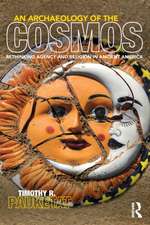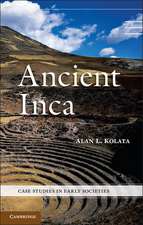Collective Action in the Formation of Pre-Modern States: Fundamental Issues in Archaeology
Autor Richard Blanton, Lane Fargheren Limba Engleză Hardback – 19 oct 2007
Given the need for new directions in theory, the book proposes that anthropologists look to political science, especially the rational choice theory of collective action. Collective action theorists propose that state formation results from the strategic behavior of rational and self-interested actors who make up the polity, including a political elite and those outside the official structure of the state. The theory proposes that the form taken by a state will depend on the “bargaining power”, of rulers and taxpayers. Where taxpayers have more resources with which to bargain, it is predicted that rulers will concede benefits to taxpayers and will agree to restrictions on their power.
The authors subject collective action theory to a methodologically rigorous evaluation using systematic cross-cultural analysis based on a world-wide sample of societies. The results presented here indicate strong support for most elements of the theory, but some results, in particular those pertaining to the control of ruler behavior, suggest the possibility that there are contexts in which collective action may play out in ways not anticipated by the theory.
While this type of theoretical modeling is commonly seen in political science research, this volume is unique in its approach from an anthropological and archaeological viewpoint.
| Toate formatele și edițiile | Preț | Express |
|---|---|---|
| Paperback (1) | 1225.31 lei 6-8 săpt. | |
| Springer – 23 noi 2010 | 1225.31 lei 6-8 săpt. | |
| Hardback (1) | 1231.47 lei 6-8 săpt. | |
| Springer – 19 oct 2007 | 1231.47 lei 6-8 săpt. |
Preț: 1231.47 lei
Preț vechi: 1501.79 lei
-18% Nou
Puncte Express: 1847
Preț estimativ în valută:
235.72€ • 256.13$ • 198.13£
235.72€ • 256.13$ • 198.13£
Carte tipărită la comandă
Livrare economică 21 aprilie-05 mai
Preluare comenzi: 021 569.72.76
Specificații
ISBN-13: 9780387738765
ISBN-10: 0387738762
Pagini: 448
Ilustrații: XXVI, 448 p.
Dimensiuni: 155 x 235 x 27 mm
Greutate: 0.84 kg
Ediția:2008
Editura: Springer
Colecția Springer
Seria Fundamental Issues in Archaeology
Locul publicării:New York, NY, United States
ISBN-10: 0387738762
Pagini: 448
Ilustrații: XXVI, 448 p.
Dimensiuni: 155 x 235 x 27 mm
Greutate: 0.84 kg
Ediția:2008
Editura: Springer
Colecția Springer
Seria Fundamental Issues in Archaeology
Locul publicării:New York, NY, United States
Public țintă
ResearchCuprins
Introduction The Rise and Demise of Neoevolutionist Theory.- The Theory of Collective Action as Applied to Pre-Modern States.- Historical Backgrounds to the Study Regions and the Coded Societies, Part I: Introduction and East Asia.- Background to State Formation and the Coded Polities in Southeast Asia.- Background to State Formation and the Coded Polities in South Asia and the Coded Polities .- Background to Sub-Saharan African State Formation.- Background to State Formation in Western Eurasia and the Mediterranean/North Africa.- Background to the New World States.- Material and Social Background to the Coded Societies of East Asia and Tibet.- Material and Social Background to the Coded Southeast Asian Societies.- Material and Social Background to the Coded Societies of South Asia.- Material and Social Background to the Coded African Societies.- Material and Social Background to the Coded Societies of West Eurasia and the Mediterranean/North Africa.- Material and Social Background to the New World Coded Societies.- A Method for Comparing Revenue Sources.- Public Goods.- Bureaucratization.- Modes of Control of the Behavior of Principals.- Main Results and Conclusions.- Conclusions, Part II: Collective Action in Relation to World-System, Region, and Community.- Final Reflections on Collective Action as an Approach to the Study of Pre-Modern States.- What is a “Modern” State?
Notă biografică
Dr. Blanton is a professor of Anthropology at Purdue University. He is known for his research on the evolution of pre-Hispanic Mesoamerican civilization, especially in Central Mexico and the Valley of Oaxaca but has also contributed to several more general anthropological topics, including the economics of peasant households and household archaeology, the evolution of market systems in early civilizations, pre-modern world-systems, and cultural ecology. Blanton's recent theoretical and comparative research on the nature of early state formation and political economy is regarded as a new departure that is making a contribution to the current discourse on the evolution of complex human societies. He is a founding member of the Society for Economic Archaeology and has served as its president.
Textul de pe ultima copertă
Collective Action in the Formation of Pre-Modern States
by Richard Blanton and Lane Fargher
Purdue University, West Lafayette, IN
Research over the past half-century has substantially increased the quantity and quality of information on the evolution of early complex societies. New methods and new discoveries have inspired anthropological archaeologists and other social scientists to rethink prevailing theories, which now seem excessively deterministic and unable to account for the role of human action in social change. The authors propose that the rational choice theory of collective action, especially as it has been developed by political scientists, is a fruitful new direction for theory-building that can overcome these limitations. This theory addresses the dilemma faced by any group attempting to build a complex society, namely, that the rational and self-interested behavior of social actors may limit the potential for collective action and group solidarity.
This book explores a collective action perspective on the formation of pre-modern states, but does not only promote a new mode of theoretical understanding. Rather, it subjects collective action theory to a methodologically rigorous evaluation using a systematic cross-cultural analysis of historical, ethnographic, and archaeological data drawn from a world-wide sample of societies. These data provide strong support for the theory while pointing the way to a more complex and nuanced approach to collective action, uniting theories of pre-modern and modern states.
by Richard Blanton and Lane Fargher
Purdue University, West Lafayette, IN
Research over the past half-century has substantially increased the quantity and quality of information on the evolution of early complex societies. New methods and new discoveries have inspired anthropological archaeologists and other social scientists to rethink prevailing theories, which now seem excessively deterministic and unable to account for the role of human action in social change. The authors propose that the rational choice theory of collective action, especially as it has been developed by political scientists, is a fruitful new direction for theory-building that can overcome these limitations. This theory addresses the dilemma faced by any group attempting to build a complex society, namely, that the rational and self-interested behavior of social actors may limit the potential for collective action and group solidarity.
This book explores a collective action perspective on the formation of pre-modern states, but does not only promote a new mode of theoretical understanding. Rather, it subjects collective action theory to a methodologically rigorous evaluation using a systematic cross-cultural analysis of historical, ethnographic, and archaeological data drawn from a world-wide sample of societies. These data provide strong support for the theory while pointing the way to a more complex and nuanced approach to collective action, uniting theories of pre-modern and modern states.
Caracteristici
Uses political science theory in researching state formation in prehistoric societies Takes a global comparative approach Blanton is one of the founders of the field of economic and political archaeology
























